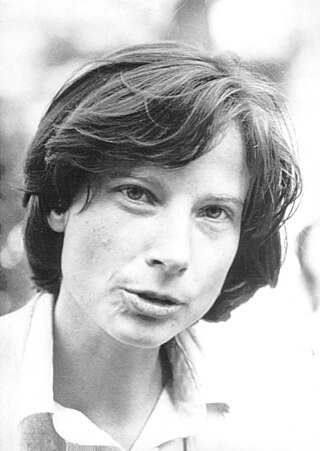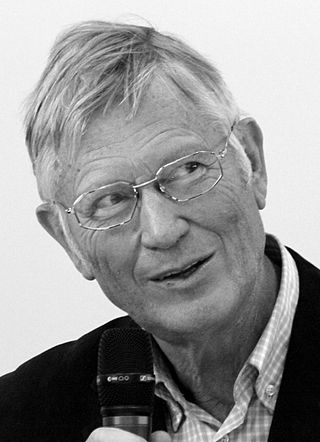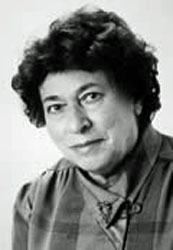Related Research Articles
Eduard Fuchs was a German Marxist scholar of culture and history, writer, art collector, and political activist.

An avant-corps, a French term literally meaning "fore-body", is a part of a building, such as a porch or pavilion, that juts out from the corps de logis, often taller than other parts of the building. It is common in façades in French Baroque architecture.

Karl Friedrich Johannes Kuhlo together with his father Eduard Kuhlo, founded the German Protestant Posaunenchor movement. Working in collaboration with the Bielefeld instrument maker Ernst David he developed the kuhlohorn for use by the ensembles.

Claudia Schmölders, also Claudia Henn-Schmölders is a German cultural scholar, author, and translator.

Barbara Stollberg-Rilinger FBA is a German historian. She mainly researches the early modern period and has held the chair for early modern history at the University of Münster. Stollberg-Rilinger is one of the leading representatives of research that examines the constitutional history of the Holy Roman Empire on the basis of symbolic-ritual forms of communication. Her work on rituals, symbolic communication and ceremonial influenced research on the exercise of power in the pre-modern era.

Joachim Radkau is a German historian.

Wolfgang Nastainczyk was a German theologian, lecturer and priest who taught at the University of Regensburg alongside Joseph Ratzinger. He was the cousin of German theologian, Johannes Tenzler. Nastainczyk was born in Leobschütz, Upper Silesia, the son of Josef Nastainczyk and Gertrud Tenzler and was ordained a Roman Catholic priest on 9 June 1957.
Heinz Schilling is a German historian.

Eike Christian Hirsch was a German journalist, author and television presenter. He was host of a talk show and author of a biography about Gottfried Wilhelm Leibniz. The main themes in his books were religion, humour and German language.

Peter-André Alt is a German literary scholar, former president of the Freie Universitaet of Berlin and, since August 2018, president of the German Rectors' Conference (HRK). Alt is married to the writer Sabine Alt and has two adult sons.
Heinz Halm is a German scholar of Islamic Studies, with a particular expertise on early Shia history, the Ismailites and other Shia sects.

Ingeborg Weber-Kellermann was a German folklorist, anthropologist and ethnologist. She was an academic teacher, from 1946 at the German Academy of Sciences at Berlin in East Berlin and from 1961 at the University of Marburg.

Ulrich Raulff is a German cultural scientist and journalist.

Dörte Hansen is a German linguist, journalist and writer.
Grete Hinterhofer was an Austrian pianist, music teacher and composer.
Else Hueck-Dehio (1897–1976) was a German author.
The Principality of Nassau-Diez was a former county, later principality of the Holy Roman Empire part of the Lower Rhenish–Westphalian Circle of the empire towards the end of its history. The county was created in 1606 when the former Count of Nassau-Dillenburg's sons divided their father's lands, creating new smaller counties. In 1702, after the Glorious Revolution saw Prince William of Orange become King of England, the county was merged with others to form the new, larger, Principality of Orange-Nassau.
Hans Wolfgang Schumann was a German diplomat as well as an Indologist and Buddhologist.
Karl Larenz was a German jurist and philosopher of law. He is known for his influential contributions to German civil law, as well as for being one of the leading Nazi legal theorists in the domain of civil law.
Wilhelm Enßlin was a German ancient historian.
References
- ↑ Johnson, Trevor (2001). "Review of Shaman of Oberstdorf". The American Historical Review . Vol. 106, no. 2. Chicago: University of Chicago Press. pp. 664–665. JSTOR 2651764.
- ↑ Hulme, Mike (2009): Review: A Cultural History of Climate Reviews in History
- ↑ "Prof. Dr. Wolfgang Behringer". Universität des Saarlandes (in German). Retrieved 15 November 2022.
- ↑ Haude, Rüdiger (14 August 2019). ""Keep calm"? A critique of Wolfgang Behringer's "A Cultural History of Climate"". Journal of Environmental Studies and Sciences. 9 (4). Springer Science and Business Media LLC: 397–408. Bibcode:2019JEnSS...9..397H. doi:10.1007/s13412-019-00566-9. ISSN 2190-6483. S2CID 199577055.